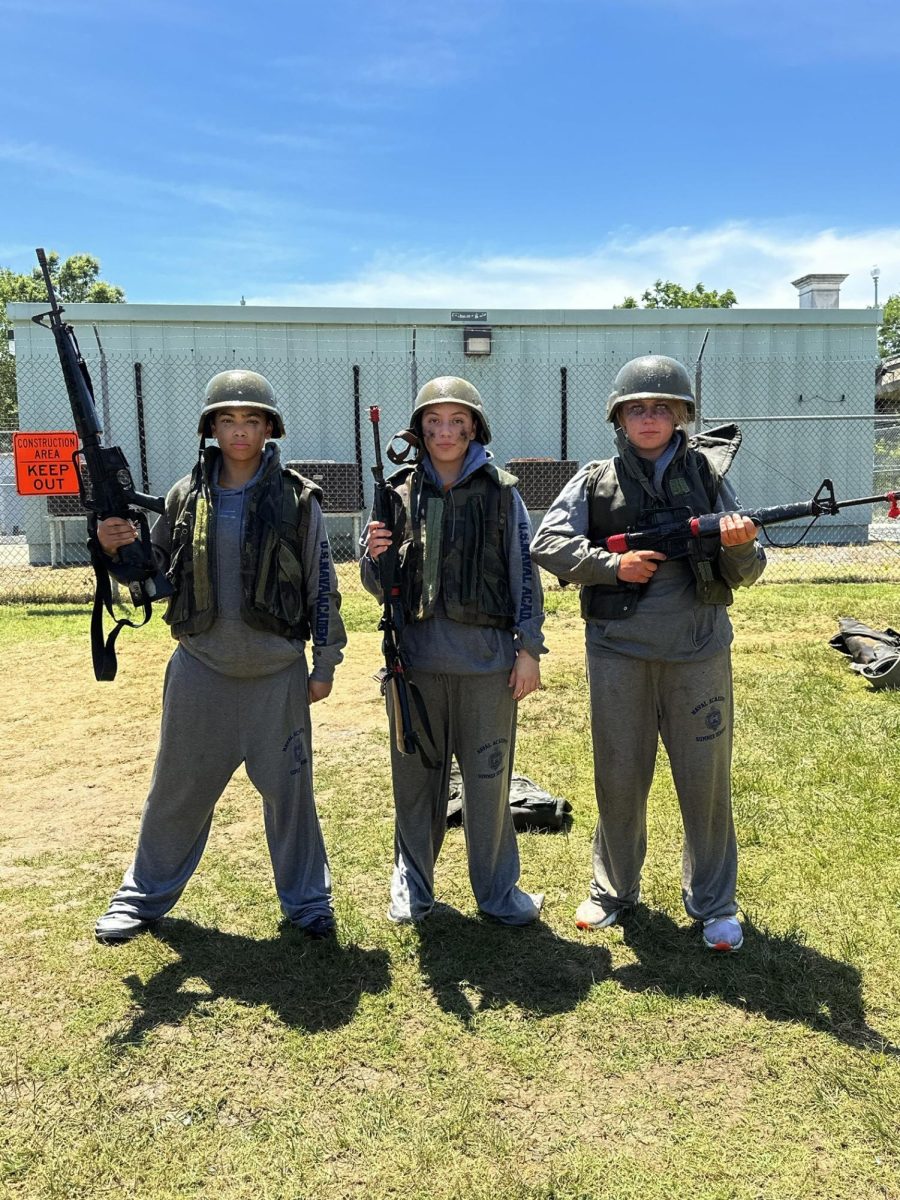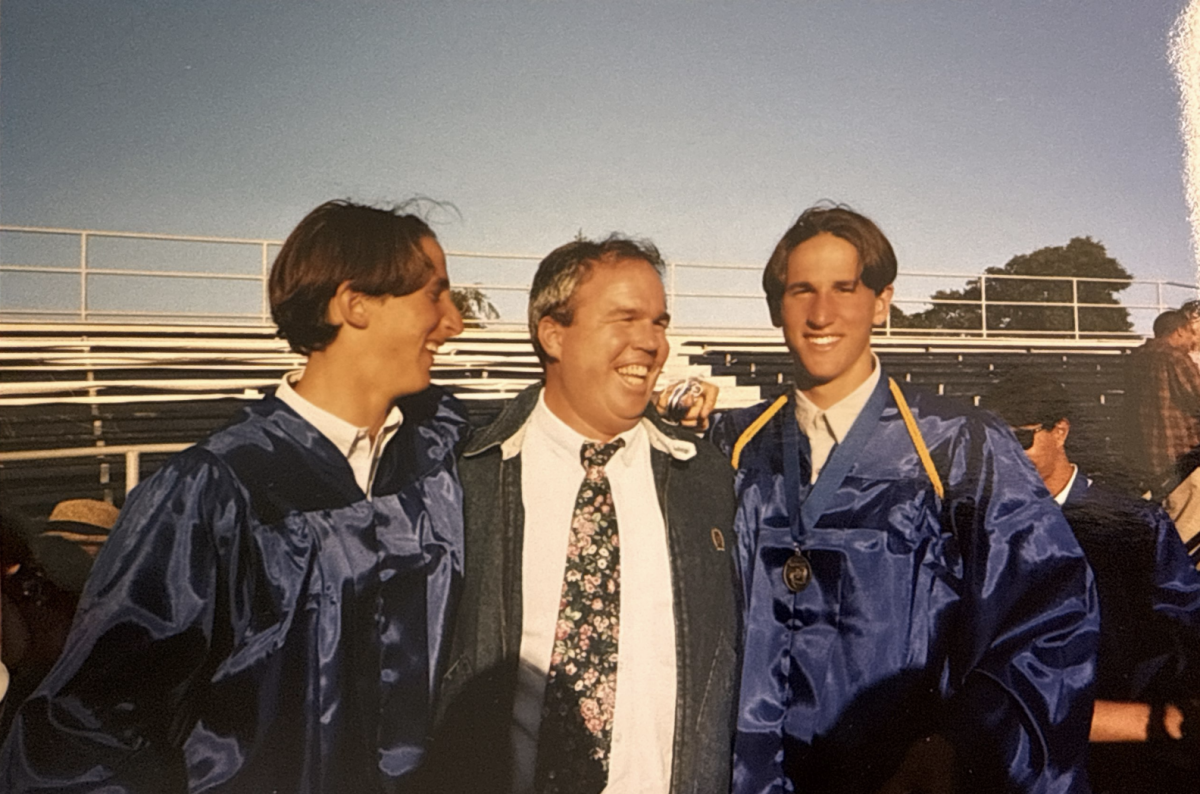The Haiti Solidarity Club, a club strongly involved in the building of a sister school in Haiti, invited the sister school director Rea Dol to LAHS again this year. Dol’s husband, Jean Jacques Bataille, came with her to visit the school. Rea and Bataille both arrived at the airport on Monday, where they were picked up by a high school van that had been transformed into a tap-tap, a Haitian bus that is painted with bright colors and covered with patterns, murals and sayings.
Along with holding an art auction of Haitian art, the club and advisor Seth Donelly also gave presentations in the Eagle Theater during the second, fourth and sixth periods. During these presentations, Donelly, Dol and Bataille talked about their experiences, their accomplishments, and what still needed to be done for the Haitian sister school. Speakers also included a few students who had traveled to Haiti in the previous year.
The following is a transcript of the presentation.
Donnelly: I want to thank you guys, I want thank your teachers for letting you be here. It is a very special occasion, I mean this one hundred percent from my core. We’ve been fortunate to have Rea Dol with us before. She was here in the last several years, and she is the director of our sister school over there. We hope that will plant the seeds in your mind, and we will encourage you all to think about going to Haiti. We have a regular relationship now with Rea and her family, and it is an amazing experience. So we’re hoping today’s presentation will plant some seeds in your minds, in your hearts, to otherwise get involved if you haven’t already. What makes it also very special to have Rea back is to have her husband Jean Jacques Bataille with her and he along with Rea cofounded the SOPUDEP organization behind the school. Bataille helped create that organization for education and human rights. These are folks who have risked their lives for their country and their community. Rea is a feminist and Bataille stands up for her in every way. For people here who are immigrants, you know that in order to get into the United States legally you need to have what is called a visa. When we and Ms. Satterwhite send an invitation for Bataille to come, the U.S. Embassy in Port-au-Prince denied him; they didn’t want him to come into the United States because they thought he would stay, which happens all of the time to immigrants from poor countries. So, we went to our representative at Congress, and she wrote a letter, and then over the summer we got the visa, so now Bataille is here with Rea today. The main attraction, of course, is our visitors, and we will have our presentation, and you will hear from your fellow students here about the experience over at Haiti. I want to communicate two important points to why it is so important to do solidarity work with Haiti in particular. In our particular part of the world, in the western hemisphere, Haiti, as you may have already heard, is the poorest country. I have traveled a lot, and it absolutely like no other place in terms of the level of poverty; you are talking about 85% of the population under poverty, like a dollar or two dollars a day poverty. Prices over there can be very high, like gas, which pushes prices up for everything, is over $5 a gallon. Seventy percent of the food in Haiti is imported from other places like the United States, and food can be very expensive. The earthquake-proof rebar in the concrete for building the new school can be very expensive. The poverty level is so high that children have to eat cookies made out of mud to soothe the acid burning in their stomaches from malnutrition. That makes it all the more important for us, as their neighbors, to step up. So much of the poverty is connected to over 100 years of U.S. foreign policy doing the wrong thing in Haiti. We have the proximity not only to raise resources like money and medical supplies, but also the power to impact foreign policy. If we could get a visa for Bataille, we could also put pressure on the government to change its policy towards Haiti; it’s up to us. It is crucial that you all are here right now. Without further ado, let’s welcome Rea and Bataille.
Rea: Thank you. Good afternoon. Today I am very happy to have this opportunity to talk to you and explain to you how difficult the situation for Haitian children is. I want to thank all of you for having an opportunity to come to Haiti and explain to you how Haitians live. So, I want to thank [Mr. Donnelly] for letting me have this opportunity to come here. Here, we have all of the opportunities to go to school, have food and use technology. In Haiti, it is different. We don’t have a government that is taking care of us, to tell them that they have a right to go to school. If someone has a good enough heart to build a school in Haiti, like me and Bataille, we do it to try to help people. I have an opportunity to stay in the U.S., to have a better life, because I have a visa, but we want to give other Haitians the chance to leave their country, and this is why we stay in Haiti, to support our country, to support our people. I started SOPUDEP as an activist. My parents were poor, and it was hard for them to send us to school, even without much food. I had use one uniform for three years. So, it is important for you to share what you have and help people living in miserable conditions. Sometimes I feed the kids only one meal a day the kids have an opportunity to have. Health care is a big challenge for Haitian people, and you support the care for Haitian families. When you support SOPUDEP, you support the lives of many kids, you support the lives of many families. When I started to work at SOPUDEP in 2002, the population there occupied a house. We started building classrooms, and I had 25 kids in my classroom. In Haiti, there are many angels – we call them angels – and they came to Haiti to support kids, to support poor people. Some did a lot of work, some just built their beautiful houses, had beautiful cars, and went to the beach. These people didn’t support the poor people who needed support. When I explained the situation to the mayor, and the mayor asked me to find a place for the children, so I built a school for the children. I started 2002 with 182, and now 10 years later I have 664 children to have an opportunity for school. It is not easy for me, since every new mayor made me move to another house. In July 2012, I wasn’t sure if I could continue using the same house. But you had be do this, and I do this for the children and you. But you came over to Haiti, and you worked physically, and you worked to help get a better education for people as an opportunity. So thank you so much for your support, and I hope that some of you can have the opportunity to come over to Haiti and share your experience to other people. You don’t know the impact of your money for Haitian people, so today it is only fair for me to tell you: thanks, because you support me a lot in different ways. So thank you so much for letting me share my experiences with you today. After the Haitian earthquake, there are many people living in tent cities. It is very hard; many people get sick. But, thank yourselves, thank the teachers, thank the principle, thank the parents, thank the kids. Thank you so much.
Donnelly: If you weren’t in our school right after the earthquake two and a half year ago, the earthquake in ten seconds killed more than 300,000 people. A lot of aid was pledged by the government and other groups. Some of those groups did good work, but others didn’t get the aid to the people living in tent cities. There is there is this huge fancy hotel called The Oasis being built in Port-au-Prince for tourists, and rumor has it that that is being built with U.S. government aid money. So where is the aid really going? ODFL at our school raised 20,000 dollars, which is not like a million dollar pledge, but a hundred percent of that went where it needed to go. Now, Battaille will speak to us, and Bataille doesn’t speak very much English; he speaks in Creole. Rea will translate.
Bataille, translated by Rea: Bonsoir. I want to explain to you the thoughts I have in my heart today. When I had this visa, I couldn’t sleep every day. I wanted to come here and meet you. I feel very happy to come to this country. Yesterday afternoon, we received a delegation. And I feel like a president, the way the kids treated me. And I want to try to thank you for all of the things you did for us. I want to thank all of the parents who let their kids go to Haiti. I told my wife that when the kids came to Haiti, they worked very very hard. They did a lot of work. For me, I couldn’t understand why they did this because in my country, we don’t do this work. When I came here, I didn’t see any work done like the kids did in Haiti. I hope every single one of you wants to come to Haiti. You can see the children who didn’t go to school who lived on the streets now can go to school. The kids living in the street who never hoped to go to school, now can have an opportunity to go to school every day. You didn’t only give money, you physically helped over there. Thank you, thank you so much.
Donnelly: I want to reinforce what Rea said that you chose to come and work under difficult conditions. Of course, you are very well taken care of; we look out for you well-being on the grounds. Life in Haiti was difficult both before and after the earthquake So, I’ll let you guys tell what it was like to arrive at Rea’s home.
Students: When we arrived at Haiti during the February trip, Rea picked us up at the airport with a tap-tap, like the one we used to pick up Rea at the airport yesterday. Basically, a tap-tap is a truck that has beautiful brightly multicolored paintings on it, like murals, beautiful sayings, things like that. When we arrived, none of us knew what to expect; none of us had ever been to Haiti before. We got Rea’s house, and we stayed in the courtyard with some of the other kids also and Rea’s family. We played basketball, and we had a really great and fun time.
Donnelly: Rea’s house isn’t that big, since they aren’t a very wealthy family, but we sent enough money in to build bunk beds, and then after the earthquake there were about 60 people living there; people’s home were destroyed, and a lot of the people living there are your age. It is not just work. During the downtime, you can play soccer and basketball with them.
In the 80’s there was a horrible dictatorship that was backed by the U.S., and a grassroots movement by the people, largely nonviolent, forced him out. Rea, Bataille, and many others behaved heroically to create a democracy, and it finally worked in 1990. The government doubled the minimum wage, dismantled the army, gave women rights, and made Creole the national language. He asked the French to pay back reparations for when Haiti was a slave colony. A former mansion was turned into a school by Rea, but they don’t own it, since Haiti is now under a militaristic based government supported by our tax money. Now they are buying land to build a new school with for kids with 17 classrooms, a computer lab, library, music room and also an orphanage. There are no power tools and no tractors. But there is a camaraderie formed by the manual work. There is also a water filtration system there for a water cistern from rainwater, which is important, since clean drinkable water is hard to come by in Haiti. The school is going to be 100% solar-powered. Rebar is going to be installed to make the buildings stronger in case of an earthquake, and money is needed to continue the construction. It is a very valuable project, working with Rea and Bataille, and it is completely funded by our school and the rotary club. The school may be completed in a year or two years, depending on the resources available. Thank you guys for coming!








